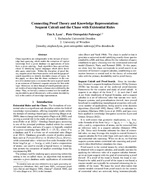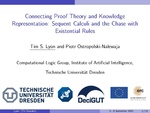Connecting Proof Theory and Knowledge Representation: Sequent Calculi and the Chase with Existential Rules
From International Center for Computational Logic
Connecting Proof Theory and Knowledge Representation: Sequent Calculi and the Chase with Existential Rules
Tim LyonTim Lyon, Piotr Ostropolski-NalewajaPiotr Ostropolski-Nalewaja
Tim Lyon, Piotr Ostropolski-Nalewaja
Connecting Proof Theory and Knowledge Representation: Sequent Calculi and the Chase with Existential Rules
Proceedings of the 20th International Conference on Principles of Knowledge Representation and Reasoning, 769-773, 2023. IJCAI Inc
Connecting Proof Theory and Knowledge Representation: Sequent Calculi and the Chase with Existential Rules
Proceedings of the 20th International Conference on Principles of Knowledge Representation and Reasoning, 769-773, 2023. IJCAI Inc
- KurzfassungAbstract
Chase algorithms are indispensable in the domain of knowledge base querying, which enable the extraction of implicit knowledge from a given database via applications of rules from a given ontology. Such algorithms have proved beneficial in identifying logical languages which admit decidable query entailment. Within the discipline of proof theory, sequent calculi have been used to write and design proof-search algorithms to identify decidable classes of logics. In this paper, we show that the chase mechanism in the context of existential rules is in essence the same as proof-search in an extension of Gentzen's sequent calculus for first-order logic. Moreover, we show that proof-search generates universal models of knowledge bases, a feature also exhibited by the chase. Thus, we formally connect a central tool for establishing decidability proof-theoretically with a central decidability tool in the context of knowledge representation. - Projekt:Project: DeciGUT
- Forschungsgruppe:Research Group: Computational LogicComputational Logic
@inproceedings{LO2023,
author = {Tim Lyon and Piotr Ostropolski-Nalewaja},
title = {Connecting Proof Theory and Knowledge Representation: Sequent
Calculi and the Chase with Existential Rules},
booktitle = {Proceedings of the 20th International Conference on Principles of
Knowledge Representation and Reasoning},
publisher = {IJCAI Inc},
year = {2023},
pages = {769-773},
doi = {10.24963/kr.2023/79}
}

